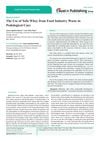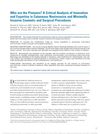 127 citations,
January 2013 in “PLOS ONE”
127 citations,
January 2013 in “PLOS ONE” Probiotic bacteria improved skin and hair health in aged mice.
 1 citations,
December 2023 in “npj biofilms and microbiomes”
1 citations,
December 2023 in “npj biofilms and microbiomes” Single-cell engineered biotherapeutics show promise for skin treatment but need more research and trials.
[object Object]  January 2023 in “Discovery immunology”
January 2023 in “Discovery immunology” T cells and bacteria in the gut and skin help maintain health and protect against disease.
227 citations,
April 2020 in “Cell” More precise, personalized therapies are needed for autoimmune diseases.
 2 citations,
January 2019 in “Indian Dermatology Online Journal”
2 citations,
January 2019 in “Indian Dermatology Online Journal” The congress concluded that misuse of antifungal drugs in South Asia has led to widespread treatment failure, and new approaches and regional cooperation are needed.
63 citations,
September 2020 in “Frontiers in Microbiology” Probiotics show promise for health benefits but need more research to understand how they work.
August 2023 in “Fermentation” Scientists can use engineered microbes to make L-aspartate and related chemicals, but there's still room to improve their efficiency.
 August 2023 in “Processes”
August 2023 in “Processes” Fermenting Dendrobium officinale with Lactobacillus reuteri CCFM8631 increases its skin care benefits.

N793 may improve hair density in people with mild hair thinning.
 2 citations,
November 2022 in “Bioscience Reports”
2 citations,
November 2022 in “Bioscience Reports” Polycystic ovary syndrome and iron overload share similar symptoms and can be potentially treated with blood removal, diet changes, and probiotics.

Thermal spring waters and their microbes could be good for skin health and treating some skin conditions in skincare products.
 53 citations,
April 2021 in “Cell Host & Microbe”
53 citations,
April 2021 in “Cell Host & Microbe” Skin bacteria, specifically Staphylococcus aureus, help in wound healing and hair growth by using IL-1β signaling. Using antibiotics on skin wounds can slow down this natural healing process.
 2 citations,
November 2023 in “Frontiers in microbiology”
2 citations,
November 2023 in “Frontiers in microbiology” The health of the gut may be important in developing new ways to prevent, diagnose, and treat alopecia areata.
 1 citations,
August 2023 in “Austin Chemical Engineering”
1 citations,
August 2023 in “Austin Chemical Engineering” Tofu whey improves foot skin health and supports sustainable cosmetics.
 January 2024 in “Burns and trauma”
January 2024 in “Burns and trauma” The skin microbiome helps heal wounds and can be targeted to improve healing.
 January 2024 in “Wiadomości Lekarskie”
January 2024 in “Wiadomości Lekarskie” Robotic hair transplantation with AI offers more reliable, precise, and efficient hair restoration.
 November 2023 in “Food science of animal resources”
November 2023 in “Food science of animal resources” Lactilactobacillus curvatus LB-P9 taken orally helps hair regrow faster and thicker in mice.
 August 2023 in “The Indonesian Biomedical Journal”
August 2023 in “The Indonesian Biomedical Journal” Rosemary essential oil improved hair growth and thickness in UVB-exposed mice.
 November 2022 in “Nihon Nyuusankin Gakkaishi/Nihon Nyūsankin Gakkaishi”
November 2022 in “Nihon Nyuusankin Gakkaishi/Nihon Nyūsankin Gakkaishi” The lotion with N793 strain significantly increased hair density and reduced hair loss safely.
 October 2020 in “Veterinary Dermatology”
October 2020 in “Veterinary Dermatology” New treatments and diagnostic methods for various animal skin conditions showed promising results.
 December 2024 in “Medicine”
December 2024 in “Medicine” Gut bacteria may affect hair loss risk.
181 citations,
December 2017 in “Trends in immunology” Intestinal intraepithelial lymphocytes are crucial for gut immunity and maintaining the mucosal barrier.
 5 citations,
September 2021 in “Cureus”
5 citations,
September 2021 in “Cureus” Depression in women with Polycystic Ovarian Syndrome (PCOS) is linked to insulin resistance and hyperandrogenism, and managing these can help reduce depression. Lifestyle changes and Cognitive Behavioral Therapy can be effective treatments.
[object Object] 2 citations,
December 2023 in “International journal of molecular sciences” Wound healing is greatly affected by the types of bacteria present, which can either help or hinder the process.
1 citations,
January 2023 in “Science Advances” The skin's microbiome helps hair regrow by boosting certain cell signals and metabolism.
November 2021 in “Frontiers in Genetics” The FAW-FS algorithm improves depression recognition, and psychological interventions help AGA patients' mental health.
 21 citations,
September 2021 in “Fertility and Sterility”
21 citations,
September 2021 in “Fertility and Sterility” A blood test level of 3.2 ng/mL of Antimüllerian hormone is good for identifying polycystic ovarian morphology in European women aged 25–45.
 15 citations,
February 2016 in “Dermatologic Surgery”
15 citations,
February 2016 in “Dermatologic Surgery” Dermatologists are the main innovators in noninvasive cosmetic procedures, with other specialties also contributing significantly.
 2 citations,
September 2000 in “International Journal of Retail & Distribution Management”
2 citations,
September 2000 in “International Journal of Retail & Distribution Management” The document concludes that understanding consumer-brand relationships is key for marketing and that perceived quality helps national brands maintain higher prices than store brands.
 1 citations,
February 2023 in “Drug Design Development and Therapy”
1 citations,
February 2023 in “Drug Design Development and Therapy” Plant adaptogens may help treat skin diseases and improve skin health, but more research is needed to fully understand how they work.























